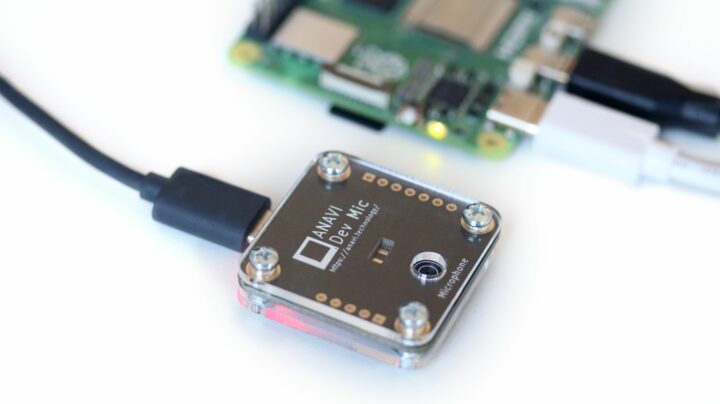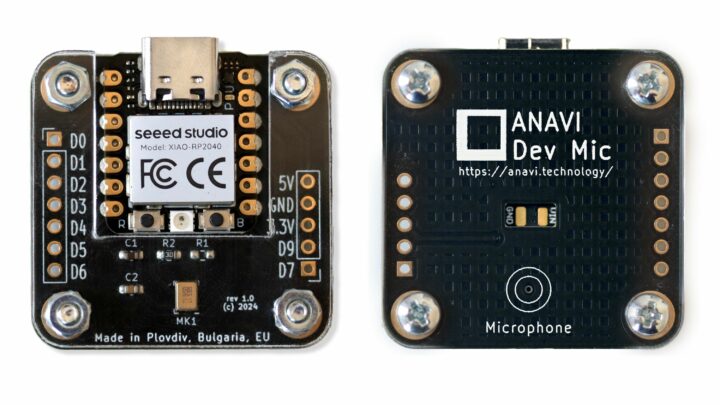The ANAVI Dev Mic is an open-source microphone board from ANAVI Technology in Plovdiv, Bulgaria powered by the Seeed Studio XIAO RP2040 module and an omnidirectional digital microphone from STMicroelectronics. It is a compact and affordable product that outperforms USB microphones in artificial intelligence and machine learning voice applications.
The design is simple and unassuming, with the Seeed Studio XIAO RP2040 module in the center, surrounded by a USB-C port for power and programming and 9 GPIO pins for extensibility. The STMicroelectronics MP23DB01HP microphone (MK1) is mounted on the top of the board with a small hole on the bottom. It is a compact, low-power, digital MEMS microphone capable of capturing sounds from different directions with very low distortion. It uses a PDM (Pulse-Density Modulation) interface created via the programmable inputs/outputs (PIO) on the RP2040.
The ANAVI Dev Mic is applicable for conducting AI/ML research, building a voice recognition platform, or creating interactive experiences. The GPIO pins on the board can be used to extend its functionality with buttons, LEDs, and sensors.
ANAVI Dev Mic specifications:
- SoM – Seeed Studio XIAO RP2040
- MCU – Raspberry Pi RP2040 dual-core Cortex-M0+ microcontroller @ up to 133 MHz with 264KB SRAM
- Flash – 2MB SPI flash
- USB Type-C port for power, data, and programming
- Microphone
- STMicroelectronics MP23DB01HP PDM MEMS omnidirectional digital mic
- Sample Rate – 16 kHz
- Connectivity — 7-pin + 5-pin 2.54mm pitch headers with 9x GPIO, 5V, 3.3V, GND
- Dimensions – 35.0 x 34.5 mm
The ANAVI Dev Mic is entirely open-source. The hardware schematics and case files are available on GitHub under the Creative Commons Sharealike license. The firmware is based on the open-source Microphone Library for Pico and the Raspberry Pi Pico C/C++ SDK. It can be connected to a PC or a single-board computer via the USB-C connector on the board.
ANAVI Technology’s other products include the ANAVI Macro Pad 12 and Arrows mechanical keyboards and the ANAVI Handle. The ANAVI Dev Mic is similar to the Mico USB microphone from Electronut Labs, also based on the Raspberry Pi RP2040.
The crowdfunding project is currently running on Crowd Supply and has attracted few backers so far. The Dev Mic is priced at $25 for the board, enclosure, and screws and nuts to hold it in place. Shipping is free within the United States but costs $12 for the rest of the world. Orders are expected to ship by November 17.

Tomisin is a writer specializing in hardware product reviews, comparisons, and explainers. He is very passionate about small form factor and single-board computers.
Support CNX Software! Donate via cryptocurrencies, become a Patron on Patreon, or purchase goods on Amazon or Aliexpress







